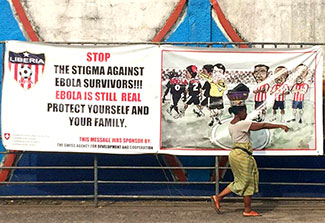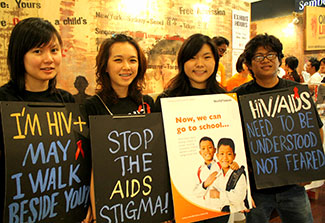Scientists urge cross-cutting stigma research, interventions
March / April 2019 | Volume 18, Number 2

© 2016 Sean G. Smith / Critical-Care Professionals
International, Courtesy of Photoshare
A soccer-themed banner in Monrovia, Liberia, urges an end
to Ebola stigma.
By Karin Zeitvogel
Stigma is a barrier to better health for vulnerable populations worldwide, despite many new interventions and scientific discoveries making strides against stigmatized conditions ranging from HIV/AIDS to depression. In a series of articles inspired by a 2017 workshop organized by Fogarty and
published in
BioMed Central (BMC), scientists are calling for stigma research to be broken out of silos that focus on a single condition or population and instead develop approaches that cut across illnesses, demographics and scientific disciplines. Effective solutions will require the expertise of researchers, practitioners, policymakers and community members, and transdisciplinary teams of scientists from public health, medicine, psychology, sociology, anthropology and other fields, working together, according to the authors of the "Collection on Stigma Research and Global Health."
Making such changes to stigma research would help to advance understanding of the drivers, manifestations and outcomes of stigma, and lead to a unified response to it, the collection says. The impact of such a shift in stigma research focus would be felt worldwide, the researchers note, because, although the burden of stigma is heaviest in low- and middle-income countries (LMICs), it also occurs in developed countries, including the U.S.
“Breaking down disease silos and working across disciplines and scientist-community member boundaries would allow us to effectively address health-related stigma and enhance health equity globally,” said Fogarty advisory board member and grantee, Dr. Gretchen Birbeck, who edited the collection. “While medical advances put better health within reach of many, stigma deters care-seeking, which generates or perpetuates health inequities,” added Birbeck, a professor of neurology and public health sciences at the University of Rochester, who spends most of her time providing clinical care and conducting research in Zambia.
Often ingrained in cultural norms and institutional policies, stigma is a powerful barrier to better health for all. Community, cultural and institutional attitudes to people with stigmatized conditions, along with internalized stigma that an individual might feel, and the prejudice, discrimination and stereotyping they face, must be addressed by research, according to the BMC collection, which was inspired by a
2017 workshop convened by Fogarty’s Center for Global Health Studies (CGHS).
During three days of meetings, U.S. and LMIC experts brainstormed how to reduce health-related stigma across disease areas, populations and settings, and refined the agenda for global stigma research. “The collection reflects the challenges, priorities and opportunities identified during the workshop - including dealing with the ethical challenges we face when conducting stigma research, developing strategies to engage stakeholders and community members, determining how to study stigma across conditions, and deciding which interventions are the most effective at reducing stigma,” said Birbeck. “Ultimately, the aim of the workshop and the collection of articles is to improve lives around the world by catalyzing new research approaches and collaborations that help to move the critical field of stigma research forward.”

© 2008 Shabana Palpanaban, Courtesy of Photoshare
Volunteers advocate for HIV/AIDS stigma issues at a busy
mall in Kuala Lumpur, Malaysia.
The workshop also informed a
stigma research program launched by Fogarty in 2018, aimed at improving HIV/AIDS prevention, treatment and care in LMICs. This effort builds on the Center’s
previous stigma research program, begun in 2002, that awarded $17 million through 18 awards. Grantees have published journal articles on topics including HIV/AIDS, epilepsy, schizophrenia, craniofacial disorders and drug abuse.
For stigma science to continue to advance, scientists must focus on developing, securing funding for, implementing and scaling up interventions, said Birbeck. These interventions must take into account new challenges that present themselves in the fight against stigma. For example, as treatments for HIV improve, people with the virus are living longer and are at greater risk of becoming disabled or developing cancer, epilepsy or another noncommunicable disease that also carries a burden of stigma. “The next stage for stigma science has to be the development and implementation of scalable interventions that address the intersectionality of stigma,” said Birbeck. “Not only would this complement the understanding that scientists already have of the causes, manifestations and outcomes of stigma, but it could improve the health of millions worldwide.”
Science of Stigma Reduction project partners include:
- University of Rochester
- London School of Hygiene and Tropical Medicine
- International Center for Research on Women
- Research Triangle Institute International
- National Institutes of Health
- Fogarty International Center
- National Institute of Mental Health (NIMH)
- NIH Office of the Director
- NIH Office of AIDS Research
- NIH Office of Behavioral and Social Sciences Research (OBSSR)
- NIH Sexual and Gender Minority Research Office (SGMRO)
- NIH Office of Research on Women's Health (ORWH)
- National Institute of Neurological Disorders and Stroke (NINDS)
- National Cancer Institute (NCI)
- National Institute on Drug Abuse (NIDA)
- Eunice Kenney Shriver National Institute of Child Health and Human Development (NICHD)
- National Institute of Allergy and Infectious Diseases (NIAID)
More Information
To view Adobe PDF files,
download current, free accessible plug-ins from Adobe's website.